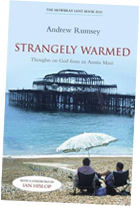| |
|
|
| Neighbours from heaven |
 |
July 2003
I was glad to read in the press recently that the Ordnance Survey maps of Great Britain are to retain the single cross as a symbol for places of worship, following a proposal that they be removed or replaced by something less "misleading". Goodness only knows what they had dreamed up as an alternative – an acoustic guitar, perhaps? Or maybe even a miniscule overhead projector?
Maps reveal much about the shape of our lives – who we think we are and what things are central to our existence. In Hereford Cathedral there hangs the great Mappa Mundi, a famous medieval map of the world, which features the Holy Land right at the centre. It's fascinating to look at – some bits, like the Mediterranean are very carefully and accurately mapped out, while other bits – Hertfordshire, for example – barely get a look in. Indeed, once you get beyond France it all becomes a bit blurred and eccentric, with sea monsters and things drawn in to show how mysterious and remote it all is.
The theology of "place" is a rich seam of Christian theology and one rarely mined by academics, which is surprising given that you can barely turn a biblical page without encountering it. From the Garden of Eden, through that most flammable matter of the Promised Land, to the vision of the heavenly city in Revelation, the writers of scripture seem fascinated by what might be termed the "geography of faith" – how where you are affects who you are under God.
Crucially, the Bible speaks of a God who has "localised" himself in Jesus Christ – or, as The Message interprets the opening of John's Gospel, has "moved into the neighbourhood". Which news, if true, should set our curtains twitching like the Dickens.
The implications of this radical belief are, as the great G.K. Chesterton put it, "as earthy as onions and as practical as potatoes", and, at the very least, suggest a God intimately concerned with what we might call (although you can bet Jesus never did) the "local environment". In historically Christian societies like the United Kingdom, divine presence and the resultant hallowing of the landscape as "this sacred plot" were largely taken for granted as part of the given order of things. God – naturally, an Englishman – was with us.
Nowadays, of course, clergy break out in a rash at the very suggestion of singing Blake's "Jerusalem" and we are all acutely aware that a quiver full of factors from increased mobility to immigration and consumerism have pulled up most of these assumptions by the roots.
As a result, issues of place swamp the news headlines from Zimbabwe to Bethlehem, and raise almost impossibly hard questions of belonging and identity. Time, perhaps, to recover a theology of place more closely in tune with that of the New Testament. The hard lesson of scripture, which Jesus taught again and again, is that we have to lose our place in order to find it. We have to release our tight grip on the things of this life in order to receive them in a different way.
In Jesus' teaching, Israel's faith has become over-localised around homeland and temple and must be re-imagined in terms of the Kingdom of God – not a territorial domain, but a spiritual reality.
This displacing of belief does not divorce us from the land, more transform the way we live in it. The need for a home in this world – a rooted and just society for all – is embraced by Jesus, but in paradox. The way home is through death and loss, giving up one's place for God's sake in order to find it again.
Jesus of Nazareth becomes a local hero during his life – it isn't until after he has died and risen that those locals realize he hasn't only done it for them. He is placed in one particular culture at one particular time, so that all particular places and times might be changed.
The New Testament describes Christ "taking our place": suffering for it, with it, and handing it back to us on Easter morning, transformed – resurrected. Hence the traditional stress on Easter as the first day of the new creation. Subsequently, each backyard and bombsite – the hidden, faceless, dislocated places – now hold the promise and possibility of renewal.
The church must be (and often is) busy at the local level, "place-forming" – growing communities that give a taster of the heaven we hope for. The implications of this for the quality of after-church coffee are obvious, I trust. Oh, and it also allows you to sing "Jerusalem" till your tonsils glow. |
|
|
 |
 |
 |
| Strangely Warmed by Andrew Rumsey is now available as a book. |
 |
 |
 |
 |
 |
| Stephen Tomkins' regular column of tales of religious lunacy from the far reaches of the Net |
 |
 |
 |
| Mark Howe's regular rant about Internet culture |
 |
 |
 |
| Also by Stephen Tomkins... a regular round-up of the saints of yore who were one wafer short of a full communion |
| |
|
|
|
|


